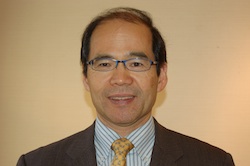By Alice Kaderlan , Special to JTNews
It takes me a minute to realize what Dr. Yoshiji Hirose has just said as he bids me good-bye after our interview.
“Oh, zie gezund,” I say to myself as he walks away, a little too late to wish him the same. It’s not that I don’t know the Yiddish expression, but even after our half hour conversation before a presentation for the Seattle Yiddish Group on Sept. 4, it’s still a shock to hear this Japanese literature professor using words from a culture so far away in time, space and religion from his own.
It’s not the first time Hirose, one of 100 university professors in Japan who teach Jewish literature, uses Yiddish in our conversation. As he tells me the story of how he became interested in Yiddish and Jewish writers, he says it was “bashert” when he discovered the Polish writer Isaac Bashevis Singer in 1977 when he was a graduate student at the University of Washington. In one of his comparative literature classes, Hirose had to choose a novel for in-depth study and he selected Singer’s Shosha, set in Warsaw in the 1930s, but even today he has no idea why.
“I didn’t know anything about Jewish people, Jewish literature or Judaism,” he explains, “but from the first page, I was very moved and touched. I cannot describe why I was so impressed but I felt some kind of longing, boyhood memories and such imagination. I found I could share those things with the writer.”
Hirose returned to Japan a year later and decided to translate Shosha into Japanese. Through the translation process he learned a lot about Singer and American Jewish literature. Several years later, a British friend suggested he take a five-week summer program in Yiddish at Oxford University. Hirose wasn’t so sure. He had no experience with Jews and no association with Yiddish, although he did speak German fluently. After careful consideration, he decided to enroll and prepared by studying Yiddish grammar books he was able to find in Japan. Even so, he found the course slow going.
“That first week was very lonely,” he said. “I didn’t understand a word since the class was in Yiddish only and all the other students were Jewish and could speak Yiddish well.”
By the second week, Hirose was making significant progress and by the time the course finished, he could understand Yiddish “pretty well.” Returning to Japan, he decided to devote himself to translating Yiddish works, but knew he needed more Yiddish. So he went back to Oxford for three more summer programs and a Master’s program. “When I went back to Japan [after my Master’s], I found that something had changed in me. I had lost a sense of Japanese as my mother tongue and even now Yiddish sounds and Yiddish music stay in my mind.”
Although Hirose doesn’t teach Yiddish to his Japanese students in American literature at Notre Dame Sienshe University in Okayama, he does spend the first month of his classes on Judaism and Jewish history so they can understand the Jewish notion of God, the Holocaust, and other themes key to appreciating the works of Saul Bellow, Philip Roth, Cynthia Ozick and others. And his affection for Judaism is obviously contagious; one of his students is now studying Judaism at Brooklyn College.
Hirose’s knowledge of Yiddish, Jews and Judaism is widely recognized in Japan and beyond. Besides his teaching and serving as president of the Japanese-America Literary Society in Japan, he lectures around the world at universities, international conferences of Yiddish clubs and local groups like the Seattle Yiddish Group.
As Hirose has delved deeper into Yiddish and Jewish culture, he’s found many similarities with Japanese culture. In his view, “Japan is a big shtetl,” he says. “We live on a very small island, so we stick together. And attachment to family and tradition is very important.”
But he admits that Jewish humor is beyond the grasp of his students and colleagues, and the way that humor infuses Jewish life is equally hard to convey in the classroom.
“Japan has many stand-up comedians,” he says, “but in lectures, you don’t laugh.”
